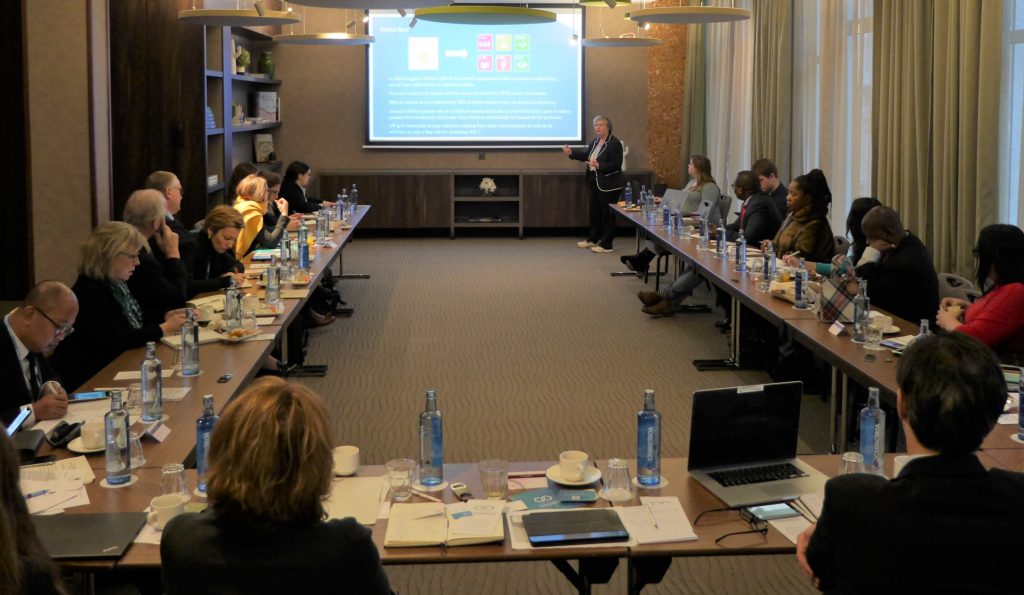
Transforming the system of energy production, leaving behind the age of fossil fuels and entering an era of producing energy with clean, renewable sources is not only economically feasible but socially and environmentally indispensable. Furthermore, in the face of anthropogenic climate change it is morally imperative particularly for the industrialised countries to meet their commitments made within the Agenda 2030 and the Paris Climate Agreement. The signatories of the Paris Agreement agreed on setting Nationally Determined Contributions (NDCs) and to increase their ambitions regarding their mitigation efforts to halt global warming. Yet, Renewable Energies (RE) still play an insufficient role in these contributions for achieving the set ambitions.
Therefore, on the 9th of December 2019 parliamentarians, associated experts, and members of the Global Renewables Congress (GRC), including 13 standing and former parliamentarians from Canada, Chile, Costa Rica, Estonia, the EU, Germany, the Philippines, and Zimbabwe, convened in Madrid, Spain to discuss the importance of Renewables Energy in fulfilling the Paris Agreement.
Two introductory interventions by Rabia Ferroukhi, Director of Knowledge, Policy and Finance Centre at IRENA and Bärbel Höhn, Chair of the GRC and Special Representative for Energy in Africa of the German Federal Ministry for Economic Cooperation and Development, explained the relevance of Renewable Energy deployment within the NDCs and the importance of integrated policy frameworks to ensure a just transition of the energy sector as well as the future of decentralised and democratised energy access in rural areas in the Global south.
Rabia Ferroukhi presented IRENA’s latest report on the inclusion of Renewable Energy in NDCs and identified a huge potential for upscaling RE. The projected development of power production through RE and alternative energy uses of renewables clearly also suggest a number of socio-economic co-benefits. Mrs Ferroukhi particularly stressed the relevance of an integrated policy framework that recognises the importance of a just transition and acknowledges the transformative potential of RE on the socio-economic structures as the basis of the energy sector.

Rabia Ferroukhi, IRENA (in front) 
Bärbel Höhn, GRC Chair (in middle)
Mitigating climate change impacts in the most vulnerable parts of societies in countries of the Global South was the focus of Bärbel Höhn’s presentation. She stressed the benefits of decentralised mini-grids for the implementation of the Sustainable Development Goals (SDGs).
Furthermore, a number of experiences from Canada, the Philippines, Costa Rica and many others showed that, regardless the geographical location or the local economic conditions, political powers are at work to directly stall climate action by hampering new installations of wind turbines, financing fossil fuel industries and opening doors for the exploitation of unused fossil resources.
Some of the major issues and opportunities when it comes to the upscaling RE deployment were identified in an interactive and lively discussion among the participants. Steering political will into a sustainable and climate-natural direction is indeed the key for a renewable energy uptake.
The need for integrated policies, placing greater focus on tackling deforestation, health issues, and environmental protection are some of the most pressing issues when it comes to dealing with energy production in the Global South. Furthermore, the need for RE-technology transfer from north to south, south-south cooperation, the strengthening of partnerships between all levels of involvement (national, regional, local) need to be overcome. To do so, members of parliament need to gain a better understanding of the many benefits of upscaling RE deployment. In order to make sound budgetary decisions a shift towards technologies and developments with the lowest negative climate and environmental impact needs to be performed.
For countries of the Global North, respectively, limiting the political influence of strong fossil fuel lobbies is one of the major issues. Participants stressed that the internalisation of external costs within the pricing of goods and services might be an opportunity to start this process. In addition, best practices and policy examples for RE need to be spread and capacity building on all levels of RE-policy-making needs to be enhanced. To create ownership and strengthen acceptance for a RE powered future, civil society needs to be involved in the process of upscaling RE. All these diverse opportunities need to be compiled into tailor-made roadmaps for a transition to a low carbon economy. These roadmaps can be a further step in the direction of a just, inclusive, democratic and climate-neutral future. Finally, participants stressed that the North’s global, historic responsibility on the issue of development, climate change and inequalities and injustices between Global North and South need to be recognised. This recognition underlies any successful and just cooperation and future relations.
The diversity of the participating MPs as well as representatives of the IRENA, the ParlAmericas, and the Pan-African Parliament of the African Union, brought a comprehensive spectrum of positions, ideas and obstacles with regard to RE to the discussion.
As a result of the GRC parliamentary meeting participating MPs concluded with a strong call for all parliamentarians worldwide to acknowledge the important role RE has to play in all sectors relevant to achieve the Paris Agreement’s temperature targets, and for “actions in line with the Paris Agreement and implement adequate, swift and just climate change and renewable energy legislation”. A joint call for action was launched emphasising the need to further ‘upgrade’ local NDCs. Please find the Joint Declaration here.
Creating a platform and space for parliamentarians to exchange experiences, knowledge and lessons learned is one of the main objectives of the GRC. This was the third, of a row of GRC breakfasts for members of parliament, following the first in Berlin in June and second in Brussels in November 2019.
by Naemie Dubbels, Junior Project Manager






